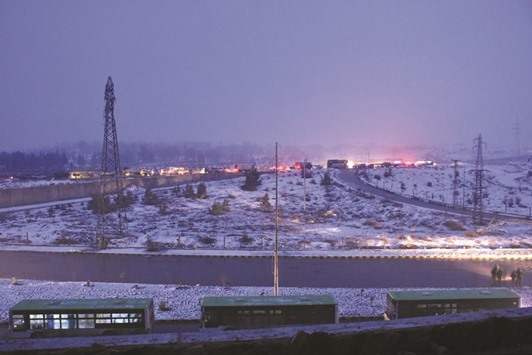Evacuations from the last rebel-held pocket of Aleppo resumed yesterday despite heavy snowfall, clearing a path for Syria’s army to take full control of the devastated city.
The evacuations - which have seen thousands withdraw from the one-time opposition stronghold of east Aleppo - faced delays earlier yesterday, leaving hundreds hungry and cold waiting to escape.
But Syrian state television reported that after a 24-hour delay, 20 buses carrying “armed men and their families” had left for rebel territory to the west of the city.
Ahmad al-Dbis, who heads a team of doctors and volunteers co-ordinating evacuations, said a convoy of 20 buses had transported 1,500 people out of the last rebel pocket of Aleppo, including 20 wounded.
The evacuations were on the verge of being finished, according to Ahmad Qarra Ali of the powerful Ahrar al-Sham rebel group.
“All the evacuations will be completed today, in several convoys,” he said.
At least 25,000 people have left rebel districts of Aleppo since opposition fighters agreed last week to withdraw after years of fighting, according to the International Committee of the Red Cross, which is overseeing the operation.
The retreat from Aleppo - which had been divided into a rebel-held east and government-controlled west since 2012 - marks the biggest victory for President Bashar al-Assad’s forces in nearly six years of civil war.
It follows a month-long army offensive and weeks of siege that killed hundreds and left rebels with less than 10% of the territory they once controlled in the city.
Brokered by regime ally Russia and opposition supporter Turkey, the evacuation plan has moved forward in fits and starts.
After seeing no movement yesterday morning, an AFP correspondent saw buses arriving one after the other in the afternoon in Ramussa, the government-held district of southern Aleppo through which evacuation convoys have been passing.
The evacuees had spent hours in freezing temperatures waiting in the buses to depart, as snow blanketed Aleppo and swirled through its crumbled buildings.
“The buses are not heated. The passengers, including women, children and elderly people, are suffering from the cold. They don’t have food or water,” said doctor Dbis.
Robert Mardini, the regional head of the ICRC, called for evacuations to resume, saying on Twitter that “weather conditions are harsh and people are exhausted”.
It was unclear how many civilians remained inside east Aleppo, though Dbis said there were “a few thousand” who were still hoping to leave.
The delays yesterday appeared to be connected with a parallel evacuation of residents taking place in the villages of Fuaa and Kafraya in northwestern Syria.
The two Shia-majority villages are under siege by the rebels.
Iran, another key Assad ally, was reported to have insisted on the evacuations of Fuaa and Kafraya for the Aleppo withdrawal to go ahead.
Delays in the evacuations were reported there - after about 750 people had been able to leave in recent days - but later yesterday state television reported that four buses, and two ambulances carrying wounded, had been able to leave.
The evacuation of Aleppo’s rebel sector is seen as a pivotal moment in a war that has killed more than 310,000 people and triggered a major humanitarian and refugee crisis.
As well as handing a major victory to Assad, it has given fresh energy to international efforts to end the conflict.
Russia, Iran and Turkey agreed on Tuesday to guarantee Syria peace talks and backed expanding a ceasefire in the country, laying down their claim as the main powerbrokers in the conflict.
In a joint statement, Russian Foreign Minister Sergei Lavrov said the Aleppo evacuation should finish within “one or two days”.
Repeated diplomatic attempts - including several rounds of peace talks in Geneva - have failed to resolve Syria’s conflict, but UN envoy Staffan de Mistura has said he hopes to convene new negotiations in Geneva in February.
The United States, another supporter of the opposition, has for years been a key player in the diplomatic efforts but has been largely excluded from involvement in the evacuation effort.
With President Barack Obama in his final weeks in office, Lavrov on Tuesday praised the Turkey-Iran-Russia format on Syria as the “most effective” way forward.
In a rare show of international unity, the UN Security Council did on Monday unanimously adopt a French-drafted resolution to monitor the Aleppo evacuations.
The government and other parties on the ground agreed to allow 20 observers to be sent to east Aleppo to monitor evacuations, UN spokesman Stephane Dujarric said, but it was unclear when they would be able to deploy.

Buses are seen during an evacuation operation of Syrian rebel fighters and civilians yesterday.
